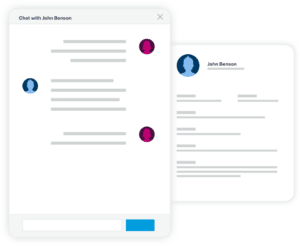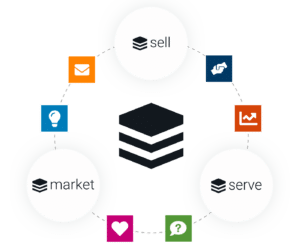How Can a CRM Add Value to Your Organization?
In the early 2000s, customer relationship management (CRM) platforms were something only the early adopter companies had. They were the “bells and whistles” not everyone could afford (or understood how to properly use). Today, CRMs are no longer “nice to have”—they’re essential to every company’s sales success. More than that, they demonstrate true value by driving business growth into the future.
Not sure what value CRM platforms can provide to your organization? Let’s look at the most common yet extremely valuable benefits a CRM provides—today and beyond.
What is CRM Software?
CRM, or customer relationship management, is a technology for managing all of your company’s contacts and interactions. This may include relationships with prospective clients, current customers, suppliers, partners, vendors, etc. A CRM uses sales automation to streamline common processes like lead nurturing and quoting while improving profitability with greater efficiency.
Why Should You Implement a CRM?
Once a sales-specific tool, CRM is now applicable to every department, from marketing to service and beyond. Implementing CRM isn’t just for helping sales sell smarter—it provides a place for everyone throughout the company to view the most accurate, up-to-date information in one place.
Why implement CRM? Because the future of your business depends on it. Companies across every industry and vertical are becoming more customer-centric. To compete and serve customers as best as possible, you must have a clear view of who they are, their preferences, and your interactions with them.
Perhaps most compelling of all, customer-centric companies are 60% more profitable. This is because anticipating and meeting the customer’s needs builds deeper brand relationships and long-term trust. Customer centricity is at the core of today’s best CRM technology, providing companies with a 360-degree of each individual buyer.

6 Ways CRM Adds Value to Your Business
1. Increased Efficiency and Employee Productivity
Every minute of your sales reps’ time is equivalent to company money. This time and money go to waste when reps have to spend it completing manual tasks like scheduling meetings, inputting data, and sending drip campaigns. CRM software reduces the clicks necessary to complete daily sales tasks, letting the system do the work for you. When CRM handles these tasks automatically, your sales team has the time to devote to higher-level planning and strategy, as well as connecting directly with prospects.
2. Better Customer Service
The purpose of a CRM is in its name: customer relationship management. Having all contact details at your fingertips means you don’t have to switch between disparate systems to find it while they’re on the phone. You can delight customers old and new with service that’s tailored to their needs. This also leads to a higher likelihood of renewal, boosting sales and customer lifetime value.
3. Reduced Costs of Sales
Every sale you make requires software costs, employee time, overhead costs, and more. Integrated CRM brings many systems into one, eliminating unnecessary software or integrating programs for faster, easier access. That way, reps don’t waste time (and money) completing simple tasks or locating critical information. CRM’s automation capabilities alone make companies more economical, reducing the need for paper waste and IT assistance to customize workflows.
4. Improved Sales and Forecasting
Understand how your pipeline, quota, forecast, and attainment evolve over time with advanced visualizations, notifications, and automatic alerts. The more accurate sales data you collect, the more you’ll be able to use it to predict future trends. Accurate sales forecasting helps you plan each quarter, modify strategies to account for slow sales periods and set better goals.
5. Deeper Customer Engagement and Retention
According to Forrester and Adobe, experience-driven businesses see almost 2x higher year-over-year growth in revenue, customer retention, and customer lifetime value than other businesses. CRM platforms give you a clearer picture of who each customer is, as well as their needs and preferences, so you can tailor your interactions. When you guide new prospects along the sales journey (instead of forcing them), you can build deeper relationships that create greater retention.
6. More Detailed Data Tracking
Data is king for effective CRM. It’s what powers detailed dashboards and reporting that allow reps to pinpoint gaps and make changes. Customized dashboards also give reps the ability to automate and manage their own pipelines, evaluate performance, track quotas and goals, and view progress at a glance. Plus, mobile dashboards make it easy for reps to view real-time data, whether they’re at the office, on the road, or at home.
CRM Creates Company-Wide Value

CRM doesn’t just benefit sales. It extends its value to marketing, services, IT, leadership, and even HR as well. Here’s how:
1. Marketing — Sales CRM validates the work marketing does to fill the funnel with leads. It keeps both teams connected and aware of progress, so they work toward joint goals. Marketing also benefits from the data sales generate, using it to refine their lead nurturing processes for better conversion rates.
2. Services — Services and support can’t adequately meet customer needs without up-to-date profiles and account history. This data provides service reps with context about customers’ relationships with the company to better understand their needs, building customer satisfaction and trust.
3. IT — IT gets more time back with CRM too. Low-code or no-code software allows sales operations teams to customize the software for their needs without additional technical help. Cloud solutions make CRM even easier without the need for extensive on-site implementation.
4. Leadership — With all sales data in one place, executives can check in on team progress or individual rep performance whenever they want. Plus, they can customize dashboards to focus on high-level metrics and goals like win rate and annual recurring revenue (ARR).
5. HR — Access to reliable technology is now a major factor in job satisfaction. Today, 76% of sales and marketing leaders say their biggest frustration with CRM is that it’s either too complex, not user-friendly or lacks customization. Helpful, intuitive CRM helps sales do their job more effectively, reducing frustration and keeping reps in their jobs longer so recruiting doesn’t have to continually backfill.
Generate Greater ROI and Value with Sugar Sell
We designed SugarCRM to reduce your operational costs and build value from day one with fluid automation, seamless integrations, and intuitive tools that are easy for teams to use. Investing in CRM allows you to generate the same value in less time with automation and greater foresight. Your teams can eventually get faster and smarter about bringing in new business.
Connect with a Sugar representative today to lower your operational costs with more effective CRM.



